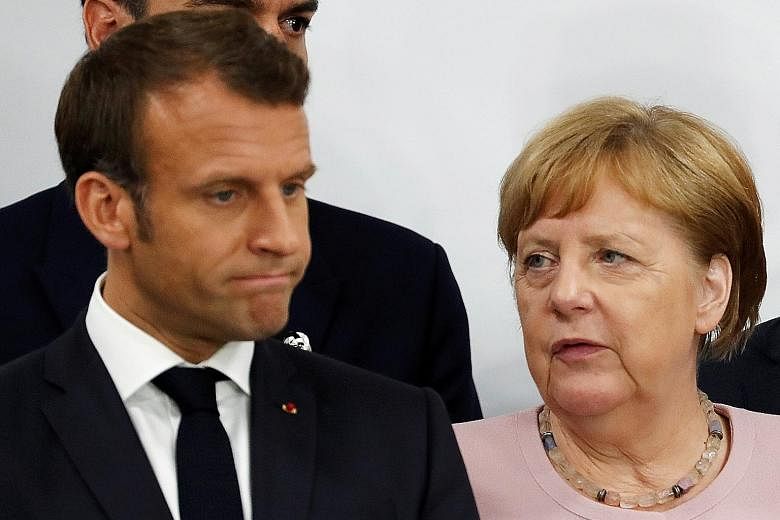BRUSSELS • Dr Angela Merkel, the German Chancellor, was uncharacteristically furious.
At a dinner to celebrate the 30th anniversary of the fall of the Berlin Wall, she huddled with President Emmanuel Macron of France, who had just given an interview in which he cited the "brain death" of Nato and wondered whether its commitment to collective defence still held.
Mr Macron had also been the sole leader to veto the start of lengthy membership talks for North Macedonia to join the European Union, despite Skopje's having done everything Brussels had asked of it, including changing the country's name. "I understand your desire for disruptive politics," Dr Merkel said. "But I'm tired of picking up the pieces. Over and over, I have to glue together the cups you have broken so that we can then sit down and have a cup of tea together."
Mr Macron defended himself, saying he could not simply go to a Nato meeting in London early next month and pretend that the United States and Turkey had behaved in the collective interest in Syria. "I cannot sit there and act like nothing has happened," he said.
The conversation underscores the serious strains in the Franco-German relationship and the tensions surrounding the abbreviated Nato meeting on the outskirts of London to celebrate the alliance's 70th anniversary.
"I haven't seen Franco-German relations at such a low point in a long time," said Dr Claudia Major, a security analyst with the German Institute for International and Security Affairs. "I've rarely seen such bitterness and misunderstanding."
Mr Macron is increasingly impatient with Dr Merkel's slow pragmatism and Germany's federalism and coalition government, Dr Major said. His wish, "in his impatient and almost nervous style", to lead and disrupt "clashes with the German system, which is very slow with Dr Merkel in her last term and a coalition just trying to survive", she said.
Mr Macron is eager to put forward longer-term strategic proposals, but is increasingly impatient with a more stagnant Germany and a divided coalition in that country, where the left-leaning Social Democrats block his European military and security proposals and the conservative Christian Democrats block his proposals for more economic integration, higher spending and eurozone reform.
Mr Macron misread Dr Merkel, thinking that in her last term she would want to create a historical legacy for the European project, as former German chancellor Helmut Kohl did by accepting the euro, and the French leader feels almost betrayed by her caution, a senior French official said.
But that is to misunderstand Dr Merkel, who "does not have big visions and is as pragmatic as you can get, and she is not going to change after 10 years", Dr Major said.
Then there is Nato, which Germany relies on for deterrence along with the countries of central and eastern Europe, whose leaders have been sharply critical of Mr Macron's musings about the alliance's weaknesses.
Dr Merkel refused to publicly accept Mr Macron's "brain death" criticism, calling his words "drastic".
While many agree privately with Mr Macron that US President Donald Trump's unpredictability and moodiness have hurt Nato, made worse by his dealings with the authoritarian and Moscow-leaning Turkish President Recep Tayyip Erdogan, they believe it was wrong to state those doubts publicly.
As Dr Francois Heisbourg, a French defence analyst, put it, Mr Macron was "talking like a think-tanker" instead of as the leader of a key Nato ally and nuclear power. But there are divisions in Nato, he said, and "at least Macron is trying to address the problem at hand".
Nato officials are struggling to agree on a joint statement, something less than a formal communique, celebrating the anniversary and recommitting Nato members to more military spending.
French officials are pressing for a reference to the need for a new strategic review of Nato's mission, to replace the last one, which was completed in 2010 and is severely outdated, while most countries prefer to wait to see whether Mr Trump is re-elected before broaching such a fundamental discussion of Nato's purpose.
German Foreign Minister Heiko Maas, trying to prevent a clash in London like the one that marred a tempestuous Nato summit meeting in Brussels nearly two years ago, has proposed an "expert group" to strengthen Nato's political thinking.
The idea would be to put the group under the consensual direction of Nato secretary-general Jens Stoltenberg, who works hard to maintain good relations with Mr Trump.
Mr Stoltenberg is also travelling to Paris to meet Mr Macron, presumably to discuss the French President's interview comments calling into question the continuing validity of Article Five.
To question it aloud is to undermine it, something Mr Trump was criticised heavily for doing early in his presidency, when he initially hesitated to endorse the provision and then mused over whether America would fight for Montenegro, a Nato member.
There are also concerns among allies that Mr Macron is considering a speech about creating a nuclear deterrence based on Europe, so as not to rely on the Americans.
That idea will further infuriate Berlin and the Central Europeans, in part because no one believes that France's nuclear deterrent is capable of covering the continent, and the British nuclear deterrent is almost entirely dependent on American nuclear missiles.
NYTIMES

